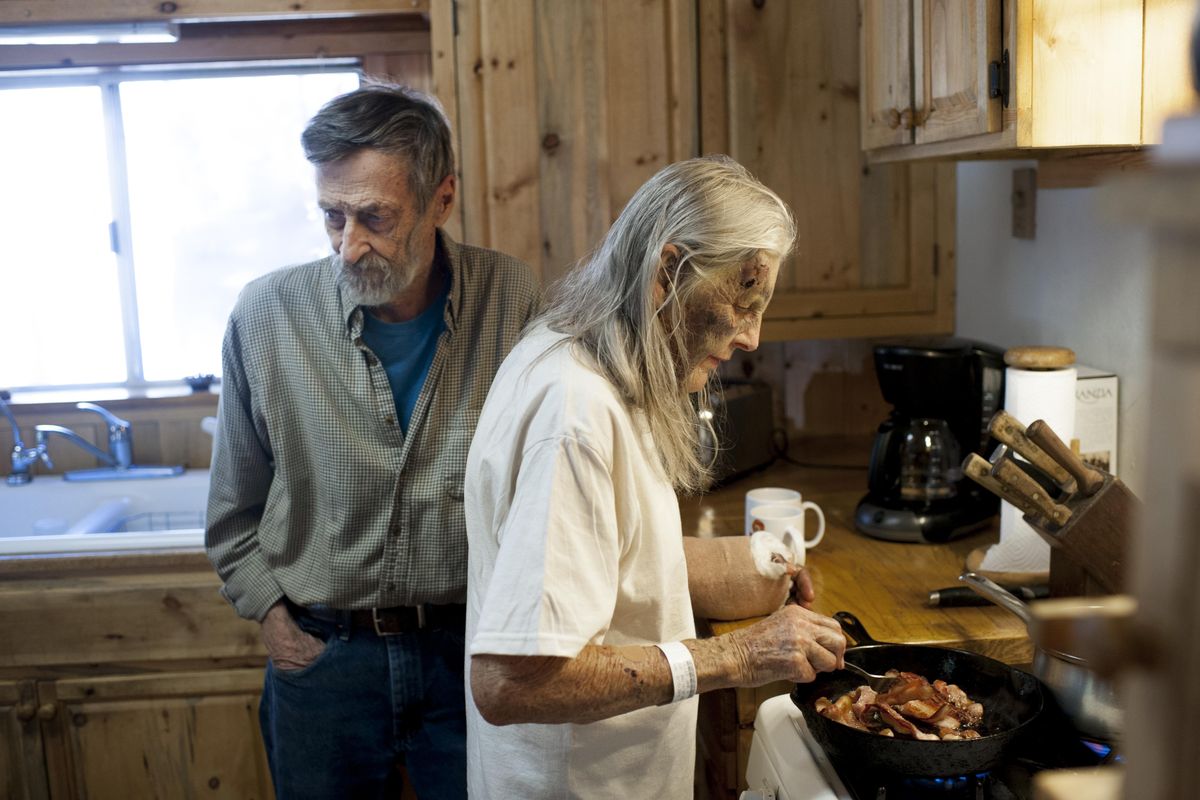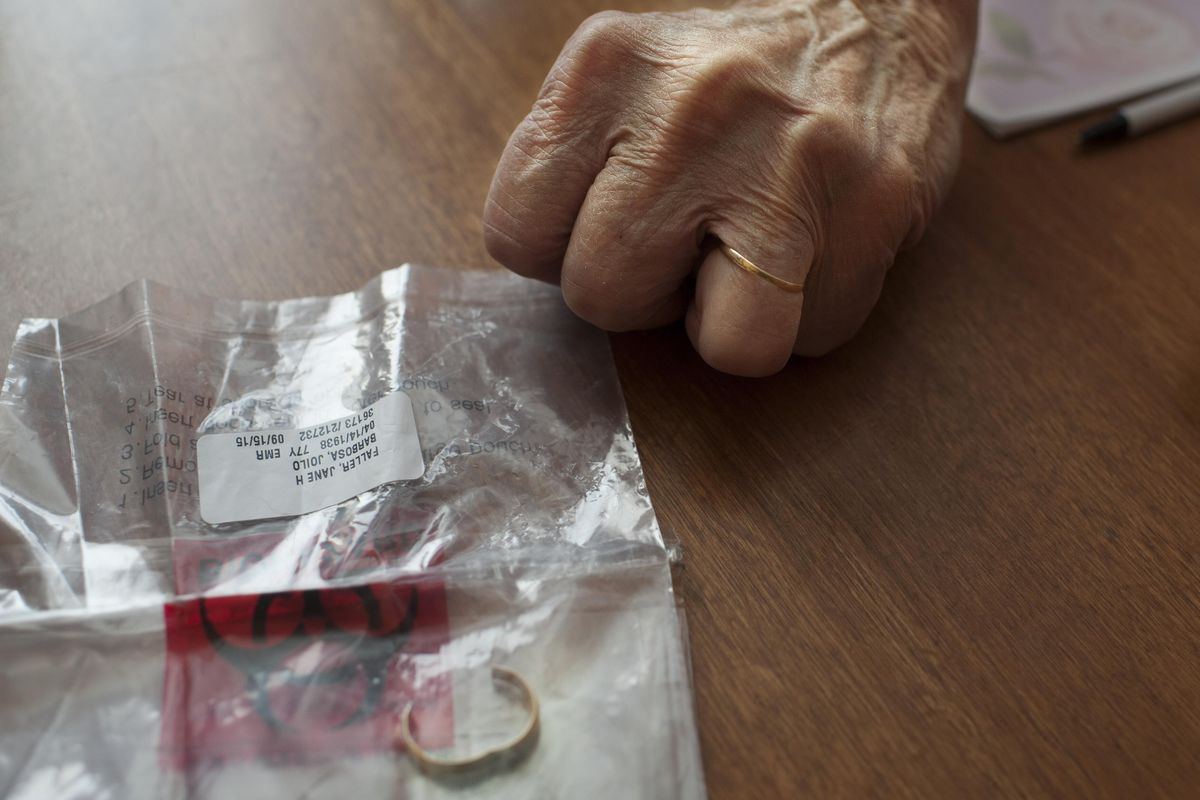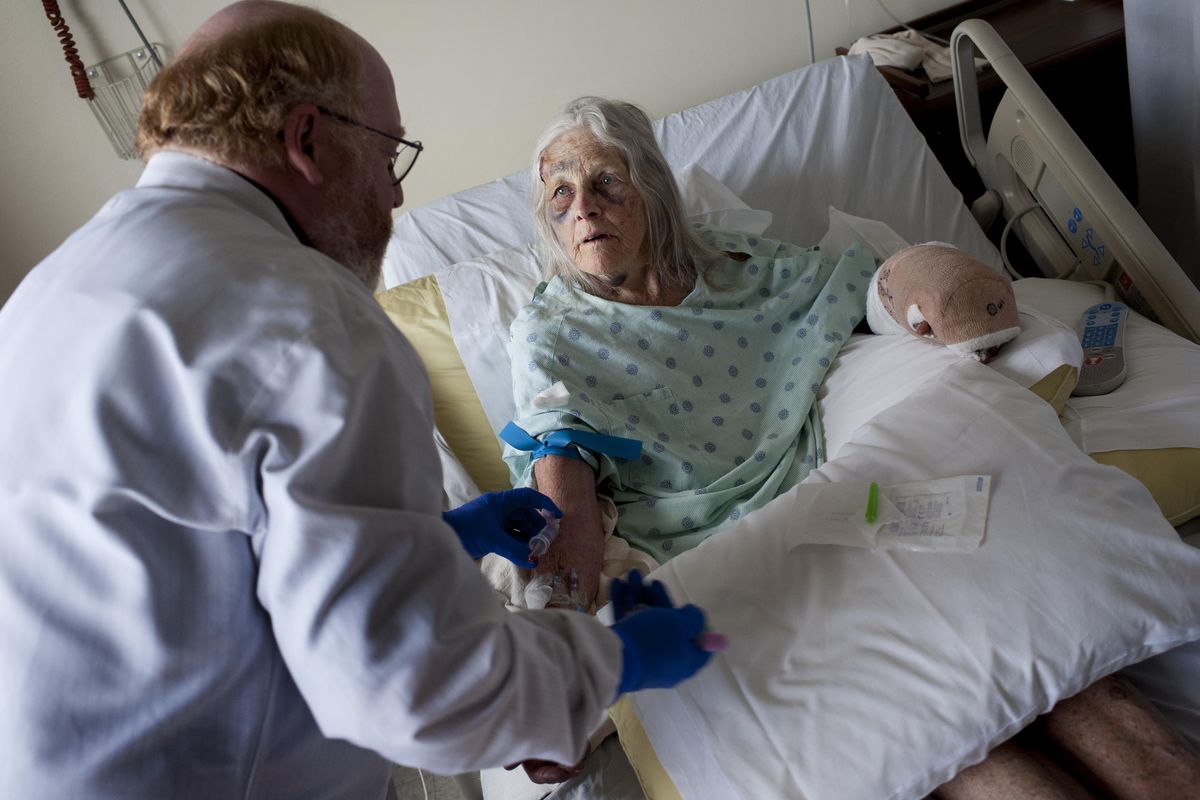Rural Aging: An accident separates a couple, cheating them out of precious days
Bob Faller places his hand next to the wedding ring doctors had to clip from his wife’s finger after she fell on their property near Republic, Wash. She experienced dramatic swelling and was hospitalized. (Tyler Tjomsland)Buy a print of this photo
REPUBLIC, Wash. − Bob Faller’s heart broke, a tight ripping in his chest, when the doctor cut the gold ring from his wife’s finger.
The couple held hands and cried, waiting for an ambulance to take Jane Faller three hours over mountain passes to the big hospital in Spokane, where after six days and three surgeries doctors finally stopped the internal bleeding in her left hand.
The weather was too severe for an air ambulance, but Jane couldn’t wait. Her hand and arm were swelling from a fall the evening before and she needed surgery to save her arm. Nearly three weeks ago, a walk with the dog sent her crashing into either a tree or a rock when her feet hit loose gravel on a hillside.
She refused to let Bob call 911 and spent the night in agony. At daybreak, Bob insisted on driving her to the emergency room in Republic.
The simple, worn ring had not left Jane’s finger for 58 years. Not since the two New York City youngsters walked down the aisle making a forever commitment that is stronger than ever, even as their world unravels.
“It was the saddest thing I’ve ever seen in my life,” said Bob Faller, still sobbing a few hours after the ambulance took Jane. He couldn’t shake the image of the metal cutters releasing the tiny band from his wife’s hand. It was just too symbolic − slap-in-the-face evidence that their love, their marriage, their joyful life together on this Earth is ending.
“It’s like the universe is insulting me,” Faller said, throat cancer making his voice more gravelly and harder to hear each day. Earlier this summer, wildfires forced the couple to prepare for evacuation from their beloved home in remote Ferry County, the same week he started hospice care. “This isn’t how I wanted it.”
Two months to live
This week, a hospice nurse who visits twice weekly predicted Faller has two months to live. He’s lost too much weight, too quickly. A hospital bed arrived Wednesday and was set up in the living room by the window. Neither of the Fallers looked forward to its arrival; another symbol of the end.
While Jane was in the hospital in Spokane, Bob sat home alone, too sick to make the six-hour round trip to sit by his wife’s bedside. The morphine from hospice helps with the anxiety and dulls some of the pain, but his headache is constant. He’s too weak to do more than sleep and anxiously wait for a faraway doctor to call and update him, a call that didn’t come for two days.
Once Jane returns home, things are no easier. In fact, in many ways they’re harder, since the mobility of her injured arm is limited. But at least the two are together.
Jane laughs, recalling that when she woke up Thursday morning, Bob was snuggled in their bed next to her. He didn’t want to spend the night away from her, even if it’s just one room away.
“He’s a hot potato,” she joked.
The long surgical cuts on either side of Jane’s hand are slow to heal, and the bandages must be changed twice a day.
But Bob is too sick to help, and Jane can’t accomplish the task one-handed. Ferry County, the poorest and one of the more sparsely populated counties in Washington, has no home health care service.
Cherie Gorton, of Rural Resources Community Action, said the county has been without home health services for a couple years. It’s a big burden, she said. She’s pushed for it to return, talking with the service provider in Omak and lobbying the Ferry County Public Hospital District. So far, nothing has happened, forcing people to visit the hospital, stay in expensive skilled nursing facilities or go without.
Fortunately for the Fallers, their friend, Deborah Anthes, is a retired nurse who comes twice a day to change the dressing. That’s a perk of living in a small community − people join together and help.
Deb’s husband, Steve, and another friend helped clean the Faller’s water system while Jane was in the hospital. The task was one of the things on Bob’s to-do list, items to get done before he dies and leaves Jane alone on their acreage during the winter. Some people brought wood. The neighbor has pledged to keep the driveway plowed this winter.
Yet the looming question that nobody really wants to face is whether Jane can continue to live in the house by the creek with its large greenhouses, gardens and pen of chickens.
‘I’ll take care of you’
While at Providence Sacred Heart Medical Center in Spokane, Jane impatiently lay in the bed, her swollen arm wrapped and elevated. Her fingertips, black as night, poked out. A bruise ran up her arm nearly to her shoulder.
Her face looked even worse, with a goose egg over her right eye and so many bruises that her coloring resembled stewed plums.
She let out a deep, sad sigh. “I just need to go home.”
Yet modern technology let her see and talk with Bob and their dog, Murphy.
“You look good Janie,” Bob said, his face filling up the laptop screen during a Skype session set up by friends. “Let’s get this over with. Get you home.”
Murphy, the dog, bounced around and sniffed the screen, confused by seeing and hearing Jane but not finding her person. She was a little embarrassed Bob could see her face so large on the screen.
Friend Steve Anthes, whose wife is changing Jane’s bandages, brought his laptop to Bob’s house for the Skype session. Luckily, the Wi-Fi signal was strong at Faller’s house that afternoon.
“This is really making a difference for Bob,” Anthes said.
Jane didn’t come home for three more days. When she did, Bob tried to open the car door before the vehicle stopped. He knelt and put his head in her lap. She gently stroked his hair with her good hand. Once inside, they sat on the couch and embraced. Bob kept touching her arm, causing Jane to yell. They laughed.
“I’m so glad you’re home,” Bob kept repeating. “I’ll take care of you.”
The next morning, Jane woke early and stood in her yard watching the dog play. She took deep breaths and enjoyed the sun on her face. She insisted on going for a walk after breakfast, stir-crazy after her long hospital stay.
The cottonwoods by the creek smelled warm. A few leaves fell. Murphy the dog discovered a fresh pile of bear scat by Bob’s favorite apple tree, the old, tenacious one that still produces apples. Bob drove the minivan and parked by the greenhouse, no longer able to walk that far. The couple fought about whether to pick tomatoes and whether to gather pears for sauce. No work, Jane said. She just wanted to relax. Bob seemed eager to accomplish a task. He picked a small basket of overripe tomatoes to feed the chickens. Then he napped, Jane by his side.
Earlier, Bob helped Jane make eggs and toast. He brewed his famous coffee, the one thing Jane repeatedly begged for in the hospital − a good cup of Bob’s coffee.
He seemingly became weaker by the minute. Kneeling on the floor, holding his head while he waited for the toast to pop.
Hospice nurse DiAnne Lundgren arrived and noticed his episodes of kneeling. Yet Bob said he felt better with Jane home, his depression not so deep.
“I feel good except for the goddamn cancer,” Bob said.
Lundgren looked at his medications, a big stack of pill containers. She showed him again the dosage of liquid morphine that he squeezes under his tongue. She encouraged him to try a drug that might make his stomach better. He waved his hand. He’s fine just drinking Ensure and not eating solid food.
“It’s your journey,” she said. “You choose how to do it.”





